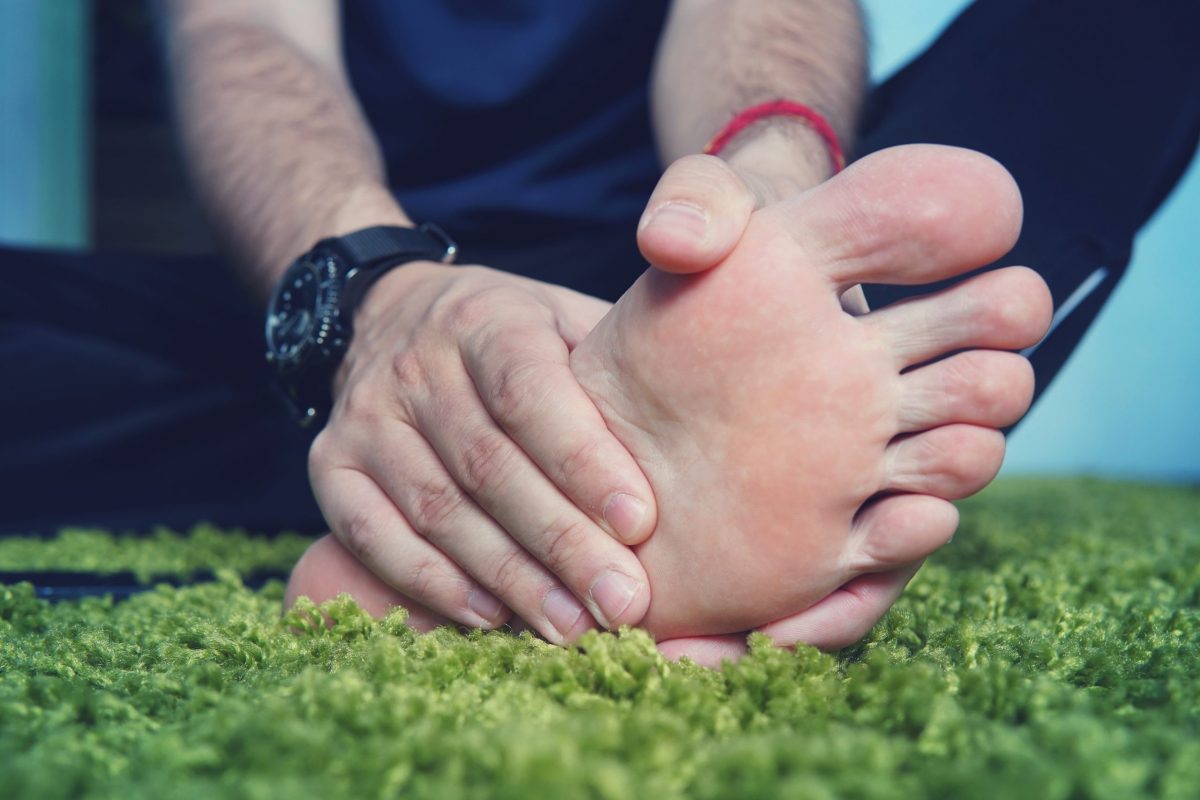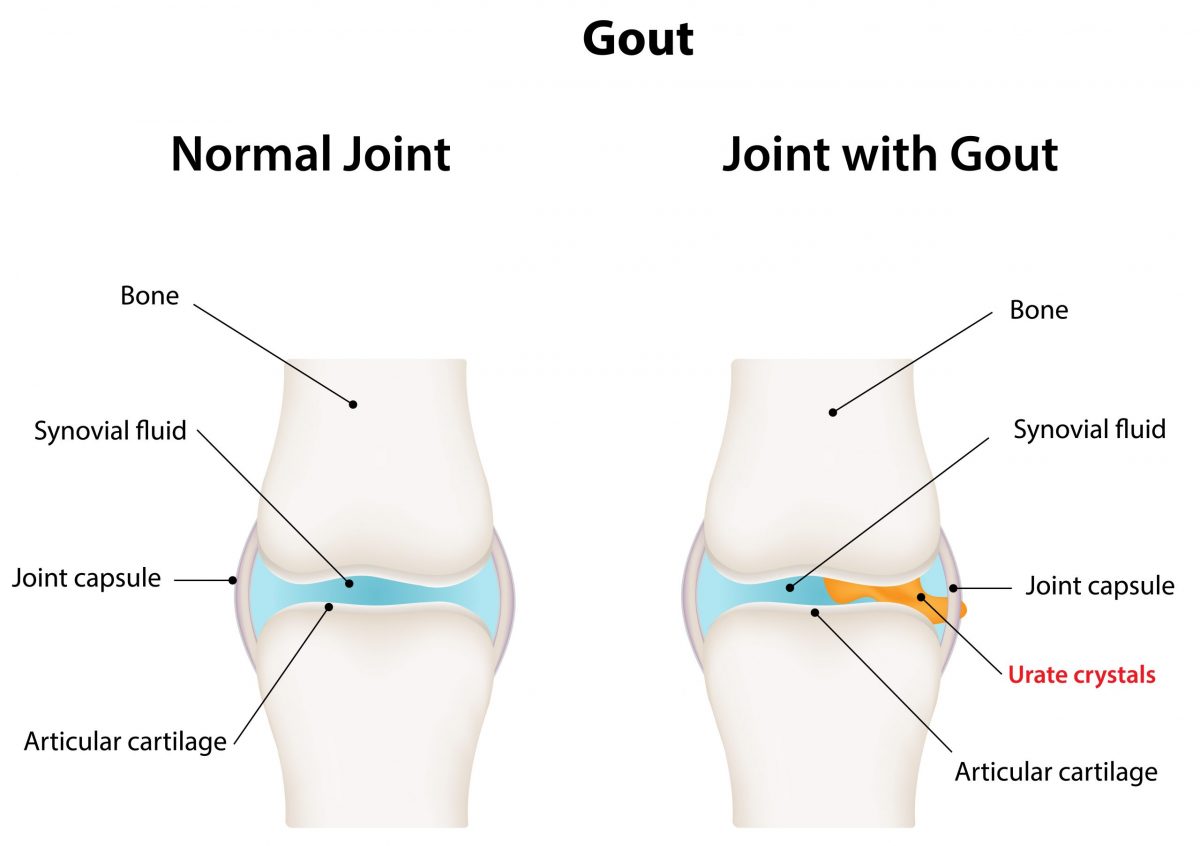
Have you experienced a sudden, intense pain in your big toe or one of your joints? You may think it is just a spasm, but it could be something a bit more serious. These symptoms could be an indication of gout.
You may be wondering, what causes gout? And, if diagnosed, what treatment options are available?
EmergeOrtho—Triangle Region board-certified doctors have the answers to all of your gout-related questions and the solutions to your discomfort. Our team provides exceptional care that helps patients recover and return to normal activities as quickly as possible.
What Are the Signs and Symptoms of Gout?
Gout is a type of inflammatory arthritis that develops when too much uric acid accumulates in the bloodstream. It worsens over time and can become chronic. You can, however, successfully control the disease and protect your joints with treatment.
Gout attacks are usually sudden, severe, and extremely painful. The affected area will typically be:
- Red
- Swollen
- Tender
- Hot to the touch
Certain cases of gout are subject to infection, which will cause a fever.
After the first gout attack, the next one may not occur for months or even years. Sometimes gout causes an infection, which will cause a fever.
After the first gout attack, the next one may not occur for months or even years. As time goes on without preventative measures, the attacks can become much more severe and frequent (referred to as acute gout attacks).
Another negative side effect of untreated gout is the possible formation of tophi: white, chalky deposits that develop around the affected joints and tendons. Tophi create visible lumps under the skin.
If gout progresses to the chronic stage, joints may sustain permanent damage and deformity. Properly treated gout rarely reaches this disabling stage.
What Causes Gout?
 Gout affects approximately 2 out of 100 people in the United States. It is caused by uric acid buildup. Uric acid is a chemical produced when the body breaks down substances called purines. Purines naturally occur in the body but can also be found in many common foods, such as shellfish, dried beans, peas, and beer. The kidneys clean uric acid out of the blood then pass it through the body in urine.
Gout affects approximately 2 out of 100 people in the United States. It is caused by uric acid buildup. Uric acid is a chemical produced when the body breaks down substances called purines. Purines naturally occur in the body but can also be found in many common foods, such as shellfish, dried beans, peas, and beer. The kidneys clean uric acid out of the blood then pass it through the body in urine.
When the body produces too much uric acid or the kidneys dispose of too little of it, it builds up in the bloodstream. The body converts the acid into microscopic, spiked uric acid crystals, a condition called hyperuricemia. These crystals can then become trapped in the joints and soft tissue.
Certain factors increase the risk of gout, including:
- Genetics
- Obesity
- Excessive alcohol consumption
- Certain medications, such as diuretics, aspirin, and cyclosporine
- Age, e.g., younger men (ages 30-45) and post-menopausal women (ages 55-70)
- Existing health conditions, such as high blood pressure, kidney disease, diabetes, and certain types of anemias
Many people are curious as to why gout most often occurs in the big toe? This answer involves uric acid’s sensitivity to temperature. The uric acid crystallizes at cooler temperatures. And, since the big toe is furthest from naturally-occurring body heat, it is often the site of gout. Gout can occur in any joint, though.
When the joints detect the crystals, the body sees them as foreign entities or bacteria. The body sends white blood cells and other infection-fighting cells to the area to combat the crystals, which results in the symptoms listed above.
What Treatment Options Address Gout?
Most cases of gout that are not in the chronic stage, can be treated successfully with a combination of non-surgical methods. Your doctor will put together a customized treatment plan for you after your examination that may include:
- Rest
- Ice
- Elevation
- Non-steroidal, anti-inflammatory medications
- Prescription medications
- Corticosteroids
- Lifestyle changes
For those who experience frequent gout attacks or develop chronic gouty arthritis, your specialist will recommend medication to lower your blood uric acid level permanently. Uric acid-lowering therapy helps prevent future acute attacks of gout and gradually dissolves the uric-acid-containing tophi.
Trust the team at EmergeOrtho—Triangle Region to help you recover from gout and Emerge Stronger. Healthier. Better. self-schedule an appointment now with one of our highly qualified EmergeOrtho–Triangle Region specialists. Or, call us any time at (919) 220-5255 to learn more about what causes gout and treatment options.







